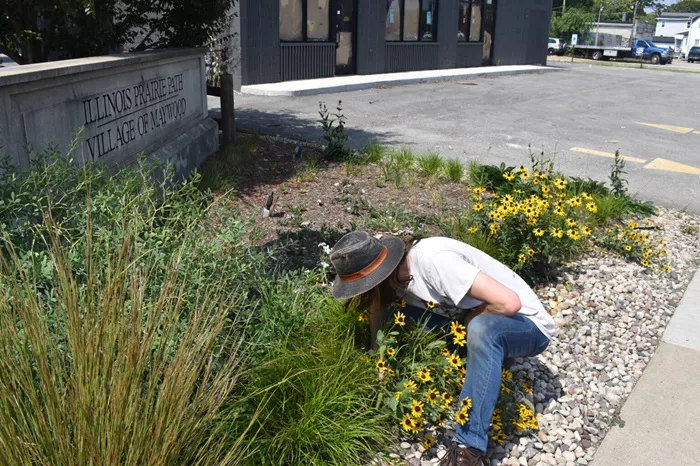Maywood, IL — A revitalization of native plants is underway at the Illinois Prairie Path trailhead on First Avenue, between Quincy and Wilcox streets, in Maywood, thanks to local conservationist Wyatt Widmer.
Widmer’s company, Wyatt E Coyote Ecological Services, has been hired by the Illinois Prairie Path nonprofit to enhance the trail and provide crucial land management. Widmer, who oversees the 82-acre Wolf Road Prairie Nature Preserve in Westchester, has observed significant improvements at the trailhead since he began work in April.
“The goal was to manage the existing flora as I would a prairie, gradually diversifying it,” said Widmer. He is also an associate director of the Save the Prairie Society, a nonprofit established in 1975 to protect the Wolf Road Prairie Nature Preserve. Widmer manages the preserve’s unique landscape, which includes savanna, wetland, and rare black soil prairie, home to nearly 400 native plant species.
“This year, we have seen substantial progress,” Widmer noted, highlighting the prairie blossoms now visible at the trailhead. “These plants are typical of prairies and healthy savannahs.”
The Illinois Prairie Path nonprofit, which oversees the 61-mile bike and walking path extending through Cook, DuPage, and Kane counties, is funding the project. Additionally, Maywood public works staff and volunteers contributed to the effort during the annual Village Pride, Village Wide event.
Widmer aims to establish a formal volunteer program for those interested in learning about native prairie plant cultivation and stewardship. He is also encouraging Maywood residents to advocate for the Prairie Path with their local officials.
Widmer envisions native prairie plants lining the path’s perimeter as it traverses Proviso Township suburbs, particularly Maywood and Bellwood. These plants not only enhance the visual appeal but also offer environmental benefits.
“There is a significant issue with abandoned infill, pavement, and scrapyards in the area,” Widmer explained. “These contribute to chemical and pollutant runoff that affects nearby properties.”
He emphasized that native prairie plants act as a natural filter for pollutants and contaminants. “Prairie plants clean polluted surface water, reducing the need for water treatment facilities funded by taxpayers. They also improve air quality by capturing carbon, gaseous pollutants, and carcinogens, often more effectively than trees.”
Widmer described the revitalization process as straightforward. “I allowed the plants to grow naturally, fostering the conditions they needed. Instead of intensive digging and replacement, I focused on replicating natural disturbances, leading to a flourishing and aesthetically pleasing plant community.”


